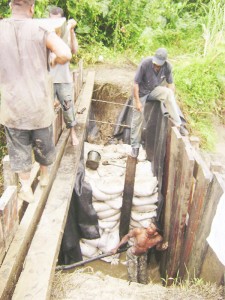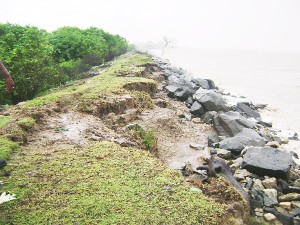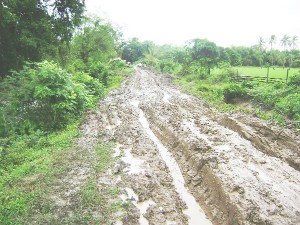Accumulated water on low-lying areas of the Essequibo Coast is causing discomfort to residents and a koker and at least one pump, which could have been helping to drain the land, are inoperable.

Residents said the Andrews koker and the pump placed next to the structure have not been in operation for quite a while and water from several villages have to be drained through the Westbury kokers. Since the land there is low, water accumulates in the community and floods the area.
Additionally, the koker at Lima is being undermined and the sea defence close to it is being washed away. Last week too, there was a breach of the “sea dam” at Middlesex but emergency works have since been done to seal it.

This rainy season, Essequibo has reported only minor flooding and on a visit to the area by this newspaper recently, several persons voiced apprehension about the rainfall, with accumulated water on the land in low-lying areas being a concern. Region Two Chairman, Alli Baksh said the region is continuing its monitoring of the weather and all drainage and irrigation structures. Some amount of flooding has been reported in the residential areas of Bounty Hall, Westbury, Suddie, Perseverance and Charity, he said.
But as the residents cope with the accumulated water, one structure that could have been used to help drain off the water is inoperable. The Andrews’ sluice is blocked with driftwood, silted up and has not been operable for quite a while, this newspaper was told. According to a resident, the authorities had promised to clean it up during the dry season, two months ago, but nothing was done. Additionally, the pump there has been inoperable for quite a long period and has not been fixed. This newspaper was told that the only thing wrong with the pump was that it leaked out the oil and a rubber seal was needed to fix the leakage but that was yet to be done.

Questioned on that issue, Baksh related that it was during the dry weather that the Andrews’ koker was blocked. He said they had hoped that when the rains came, the water would flush out the debris and the high tide would wash it away. The Regional Chairman pointed out that the region did not have a pontoon and dragline to clear the channel and had to use human labour. He asserted that private contractors did not want to carry their equipment to clear it because it was risky and declared that it was only three months ago that the koker channel was blocked.
He further declared that the pump was working but there was no need to operate it because there was no build up of water at this stage. Later in the interview, he said the pump had developed some problems with the barrel and it was a “mechanical problem” that developed during this rainy season.

He said a “technical person” was needed to fix it but the person was busy doing emergency works on the East Coast Demerara. Baksh said the Ministry of Agriculture had promised that someone would be sent and the pump would remain in that condition until a mechanic can look at it. He said the pump may have to be moved to Onderneeming.
Earlier, he had said that the region was using manual labour to “stir up” the area at the koker. Baksh said there was constant siltation in the area, adding that fishermen tied up their boats close to the koker causing it to be blocked. He said he would see if the channel could be cleared soon.
Darker mood
Meantime, there has been minor flooding in some low-lying areas. At Bounty Hall, one resident, who gave her name as Sharmilla, told Stabroek News that her yard was covered with water for over a week though not much damage was done.
In Westbury, the mood was darker. Drains were clogged and the yards of homes were flooded in varying degrees. Residents said that flooding there was a chronic problem and occurred every rainy season.
Phillip Marks and some friends stood in the light drizzle discussing the situation. They related an incident, which occurred just over a week ago and involved a drainage and irrigation excavator passing through the street. They said that they had requested that the trench be cleared but were told that they did not pay rates and taxes and so the trench would not be cleaned. They said they were told to clean it by ‘self-help’. A line through the thick weeds showed where affected residents had cleared a channel to allow water to flow. Phillips said he had lost some chickens this time. Pointing to the accumulated water in several yards, he said that the situation was horrible. “This place deh terrible… people can’t live in this condition,” he stated.
He added that people in the community were not pleased with the situation and pointed out that though there are the kokers in Westbury, the structures drain a large swathe of land. Marks stressed that the land there was a low-lying part of the coast; lower than surrounding areas, and a combination of closed kokers and rainfall, plus water coming from the backlands and clogged drains, result in water accumulating on the land. He further stated that while they did not pay taxes on the land, they paid taxes on their houses.
The plants in Devencia Pitman’s garden shone a light green against the dark soil and discoloured water surrounding the beds. She said that since the rain began, water had swamped the land at her Westbury home but it was slight. However, this time she is worried about losing her little crop. A bed had already been dug up because the young plants had rotted. She had planted boulanger, bora, ochro and callaloo. She noted that the water has not been draining off much.
Ramdai said her sheep were living on an ‘island’ and her chickens were dead. But the ‘island’ pen was small and Ramdai said the sheep were catching cramps. Her house at Westbury was an ‘island’ too. “[The] water pulling out lil and when the koker close, it coming back in again,” she observed as she opened the pen to let the sheep out. She commented that the drains need to be cleaned and dug deep. Ramdai said that since the beginning of the rainy season, water was in her yard and every rainy season, her yard floods. “They suppose to drain the place properly,” she declared.
Chronic flooding
Other residents also told this newspaper that the area suffers from chronic flooding. One man explained that several tubes drain water from the villages but do not have any ‘self-acting’ doors and when the sluice is closed, the “rebound water” re-entered the tubes and flooded the housing areas.
“We can’t do everything at one time,” Baksh said, when told of the residents’ concerns. He stated that much of the flood is caused by the residents themselves, by littering. He pointed out that some persons have tubes running from the conservancy to their fields and this could contribute to flooding, when the water is pumped out of the rice fields. He declared that the region tries to maintain drainage as much as possible stating that it was only last year that the Westbury Squatting Area was regularized and the other new schemes had the infrastructural works done by the government while some people did some self-help.
He said self-acting doors had been built but pointed to an incident several years ago, which occurred on a section of the conservancy dam between Hampton Court and La Union. The Regional Chairman stated that 83 new doors had been built and within 48 hours, 50% of these had been vandalized by farmers. “It is constantly happening with our structures,” he said adding that the region had demanded that the rangers be more vigilant.
Meantime, at Lima the koker is being undermined by the waves. Earlier this week, emergency work was done but according to one resident it was akin to “digging a hole to fix a hole”. One man said the “sea dam” had started to erode about three months ago and the regional authorities had been warned but did nothing. He said that it was not until that soil at the base of the koker began eroding that an excavator was deployed early this week to shore it up. He declared that the excavator merely took soil from a section of the sea wall and used that portion to shore up the eroded koker base. “Only one or two more spring (tide) and you ain’t gat no mo sea dam”, the man, who declined to be identified, declared. He said that when the operator was asked whether he would shore up the eroded section of the wall, the operator said that he was from the drainage and irrigation board and the sea wall was the responsibility of the sea defence board. The resident added that the actual wearing away of the sea wall had begun about two to three years ago but three months ago, it worsened.
Additionally, at Middlesex, two Fridays ago, the “sea dam” there was breached and portions of the land were flooded at about 4.40 pm. There were no major losses. The following day, temporary work to seal the breach was undertaken and when Stabroek News visited the location on Thursday, work was still ongoing and the contractor said that during the high tide later that day, the water would not be able to enter the land. They were hoping to finish the work within two to three days. The breach was being sealed by placing bags filled with mud, within a wooden structure. According to the person in charge, because machinery was unable to make it to the breach, they were forced to use manual labour and that was the reason it took a while for it to be sealed. Permanent works are expected to be done after the rainy season.
Baksh reiterated that the regional administration has been monitoring the situation and had managed to place pumps at Westbury, Charity, Anna Regina and at Onderneeming and also had a stand-by excavator. He said the region was using drainage and irrigation workers to clear drains and had meetings with stakeholders. Baksh said there has been a consistent build-up of water in the past two weeks in the Pomeroon River but it was “nothing alarming compared to what we have experienced in the past”. He said that cash crops have been affected and at New Road Charity, acres of rice had also been affected. At Suddie and Perseverance, he said, there had been flooding and kitchen gardens had been affected.





